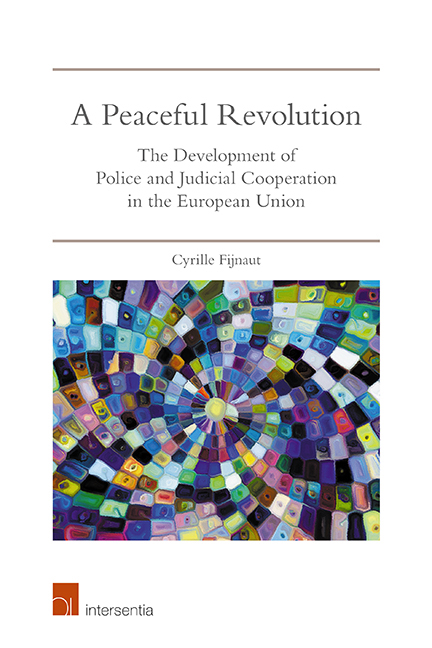Book contents
- Frontmatter
- Preface
- Contents
- List of Acronyms and Abbreviations
- Chapter 1 General Introduction
- PART I THE HISTORICAL BACKGROUND TO POLICE AND JUDICIAL COOPERATION IN THE EUROPEAN UNION
- PART II THE FOUNDATION OF POLICE AND JUDICIAL COOPERATION IN THE EUROPEAN UNION
- Chapter 4 The Treaty of Maastricht and the Brussels Programme
- Chapter 5 The Treaty of Amsterdam and the Tampere Programme
- Chapter 6 The Treaty of Rome and the Hague Programme
- PART III THE CURRENT STATE OF POLICE AND JUDICIAL COOPERATION IN THE EUROPEAN UNION
- Bibliography
- About the Author
Chapter 4 - The Treaty of Maastricht and the Brussels Programme
from PART II - THE FOUNDATION OF POLICE AND JUDICIAL COOPERATION IN THE EUROPEAN UNION
Published online by Cambridge University Press: 09 November 2019
- Frontmatter
- Preface
- Contents
- List of Acronyms and Abbreviations
- Chapter 1 General Introduction
- PART I THE HISTORICAL BACKGROUND TO POLICE AND JUDICIAL COOPERATION IN THE EUROPEAN UNION
- PART II THE FOUNDATION OF POLICE AND JUDICIAL COOPERATION IN THE EUROPEAN UNION
- Chapter 4 The Treaty of Maastricht and the Brussels Programme
- Chapter 5 The Treaty of Amsterdam and the Tampere Programme
- Chapter 6 The Treaty of Rome and the Hague Programme
- PART III THE CURRENT STATE OF POLICE AND JUDICIAL COOPERATION IN THE EUROPEAN UNION
- Bibliography
- About the Author
Summary
INTRODUCTION
The two previous chapters sketched the developments in police and judicial cooperation before and after the Second World War. The survey outlined how, in the post-war period, police cooperation and judicial cooperation were both increasingly organised along intergovernmental lines – directly through the actions of the Council of Europe and indirectly through the European Community (hereinafter: Community). The principal reason for this was to facilitate a better response to the problems connected with serious crime which – especially in the eyes of prominent politicians in these institutions – were increasingly assuming a cross-border, and in certain respects European, character and whose suppression therefore increasingly required measures at the European level. However, the need for a more effective response to the problem of terrorism played a decisive role in this context, as is evident from the Council of Europe's policy towards judicial cooperation, but also from the policy of the Community's member states with respect to police cooperation under the auspices of TREVI.
In the mid-1980s, the latter policy was discounted in the plans to expand the Community into both an economic union and a monetary and political union. Section 4.2 of this chapter is therefore devoted mainly to the role of police and judicial cooperation in the debate about the creation of the Internal Market and the establishment of the European Union (hereinafter: Union) and, by extension, the constitutional profile that this form of cooperation ultimately acquired under articles K.1–K.9 of Title VI of the Treaty of Maastricht concerning cooperation between the member states in the field of justice and home affairs, the so-called Third Pillar. It almost goes without saying that this section also discusses the role of the Schengen Agreement and the Schengen Implementation Convention in the discussion about the structure of the Third Pillar.
Section 4.3 starts with a discussion of the police and judicial components of the programme that was adopted to implement the mandate inherent in Title VI, article K.1 of the treaty, which was signed by the Justice and Home Affairs Council in Brussels on 29 – 30 November 1993 (in other words, several weeks after the entry into force of the treaty on 1 November), and shortly afterwards – on 10 – 11 December 1993 – by the European Council, also in Brussels.
- Type
- Chapter
- Information
- A Peaceful RevolutionThe Development of Police and Judicial Cooperation in the European Union, pp. 145 - 204Publisher: IntersentiaPrint publication year: 2019



